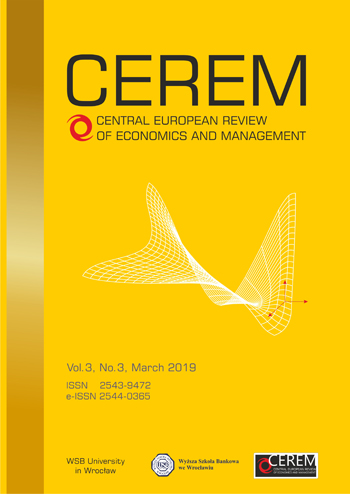Sustainability in higher education from the perspective of business ethics and corporate sustainability
DOI:
https://doi.org/10.29015/cerem.853Słowa kluczowe:
business ethics, corporate sustainability, higher education for sustainable development, interdisciplinary approachesAbstrakt
Aim: In this epilogue to the special issue, the author provides a reflection on the commonalities between the origins of business ethics and corporate sustainability on the one hand, and Higher Education for Sustainable Development on the other hand.
Design / Research methods: The paper is reflective and provides future avenues to further develop the fields of business ethics, corporate sustainability, and Higher Education for Sustainable Development.
Conclusions / findings: Although both fields developed independently, they share the same focus on interdisciplinary studies, integrated thinking, and looking beyond the short term and local interests.
Originality / value of the article: In the end, both disciplines are carried by a fundamental normative choice for an inclusive, sustainable society, a choice that should never be forgotten and is the horizon of all our research.
Bibliografia
Dernbach J.C. (ed. 2002), Stumbling toward sustainability. Environmental Law Institute, Washington.
Lambrechts W., Van Liedekerke L., Van Petegem P. (2018), Higher education for sustainable development in Flanders: balancing between normative and transformative approaches, “Environmental Education Research”, vol. 24 no. 9, pp. 1284-1300.
Lambrechts W., Mulà I., Ceulemans K., Molderez I., Gaeremynck V. (2013), The integration of competences for sustainable development in higher education: an analysis of bachelor programs in management. “Journal of Cleaner Production”, vol. 48, pp. 65-73.
Levin K., Cashore B., Bernstein S., Auld G. (2012), Overcoming the tragedy of super wicked problems: constraining our future selves to ameliorate global climate change, “Policy sciences”, vol. 45 no. 2, pp. 123-152.
Lozano R., Lukman R., Lozano F. J., Huisingh D., Lambrechts W. (2013), Declarations for sustainability in higher education: becoming better leaders, through addressing the university system, “Journal of Cleaner Production”, vol. 48, pp. 10-19.
Sutton J.F. (1998), Disembodied Capitalism: Habermas conception of the Economy, “Sociological Forum”, vol. 13, no. 1, pp. 61-83.
Tawney R. (1998), Religion and the Rise of Capitalism. Transaction Publishers, 337p.
Van Liedekerke L., Dubbink W. (2008), Twenty years of European business ethics–past developments and future concerns, “Journal of Business Ethics”, vol. 82 no. 2, pp. 273-280.
Vogel D. (2005), The Market for Virtue. Brookings Institution Press, 222p.
Pobrania
Opublikowane
Numer
Dział
Licencja
Autor przenosi nieodpłatnie na Wyższą Szkołę Bankową we Wrocławiu , bez ograniczeń terytorialnych, majątkowe prawa autorskie do tego utworu w rozumieniu ustawy z dnia 4 lutego 1994 roku o prawie autorskim i prawach pokrewnych ( Dz.U. 1994, Nr 24, poz. 83 ze zm. )na zasadzie wyłączności, tj. prawo do:
a) wyłącznego używania i wykorzystania utworu w dowolnej działalności przez Wyższą Szkołę Bankową we Wrocławiu, w szczególności w działalność Biblioteki Cyfrowej uruchomionej przez Wyższą Szkołę Bankową we Wrocławiu
b) wytwarzania, utrwalania i zwielokrotniania egzemplarzy utworów wszelkimi technikami, w tym techniką drukarską, reprograficzną, zapisu magnetycznego oraz techniką cyfrową, w szczególności ich zwielokrotniania poprzez dokonywanie zapisów na płytach typu CD,
c) zamieszczenia wybranych fragmentów utworu w celach promocyjnych w publikacjach, materiałach promocyjnych, w sieci Internet oraz sieciach wewnętrznych typu Intranet Wyższej Szkoły Bankowej we Wrocławiu,
d) wprowadzania utworu do pamięci komputera Wyższej Szkoły Bankowej we Wrocławiu,
e) kopiowania i powielania utworu w technologiach fotomechanicznych lub innych znanych w dniu zawarcia umowy (fotokopie, kserokopie itp.),
f) przetworzenia dzieła na formę elektroniczną i nieograniczonego rozpowszechniania w sieci Internet.


